Siding is a protective material attached to the exterior of a house or other structure. Designed to protect your home from the elements, it’s a critical component of any house. Siding shields your home from wind and rain, and also plays a vital role in defining its aesthetic appeal.
Choosing the right siding can dramatically enhance your home’s curb appeal, making it more attractive to prospective buyers. The cost of installing siding can vary widely, depending on the material and the size of your home, but typically ranges from $5,000 to $50,000.
Continue reading to discover the top 15 types of siding that can radically transform your home’s exterior in 2023.
15 Types Of Siding For Your 2023 Home
As we delve into the various types of siding available in the market, it’s essential to consider both functionality and aesthetics. The right type of house siding can be a game-changer, transforming your ordinary home into a remarkable architectural masterpiece.
From traditional to contemporary, there’s a wide range of exterior siding options designed to complement any home style. In this section, we’ll explore 15 outstanding types of house siding that can redefine your home’s exterior in 2023, providing both beauty and protection.
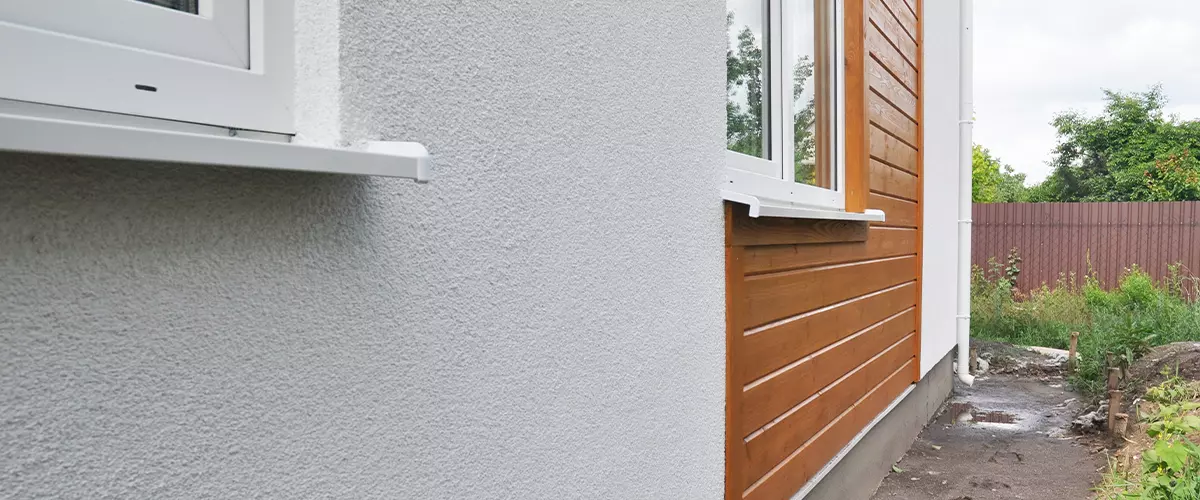
Stucco Siding
Pros & Cons
- Pros: Stucco siding is incredibly durable, resistant to both harsh weather conditions and fire. It needs very low maintenance and can last as long as the house itself with proper care. It is also excellent for soundproofing homes.
- Cons: The installation process is labor-intensive, thus making it costlier than other siding options. Moreover, it is not suited to places with excessive moisture as it might lead to cracks.
Material and Installation Costs
The material cost of stucco siding ranges from $6 to $9 per square foot. However, given the labor-intensive installation process, the total cost can go up to $10 to $14 per square foot installed.
Durability/Warranty
Fire Resistance and Soundproof Qualities
Stucco siding is fire resistant, providing an added layer of safety to your home. In addition, its dense nature gives it excellent soundproofing qualities, helping to keep your home quiet and serene.
In your quest to transform your home’s exterior, bear in mind that the best siding for your home depends on your personal preferences, budget, and the architectural style of your house. A professional installation is always recommended for any siding material to ensure its durability and efficiency.
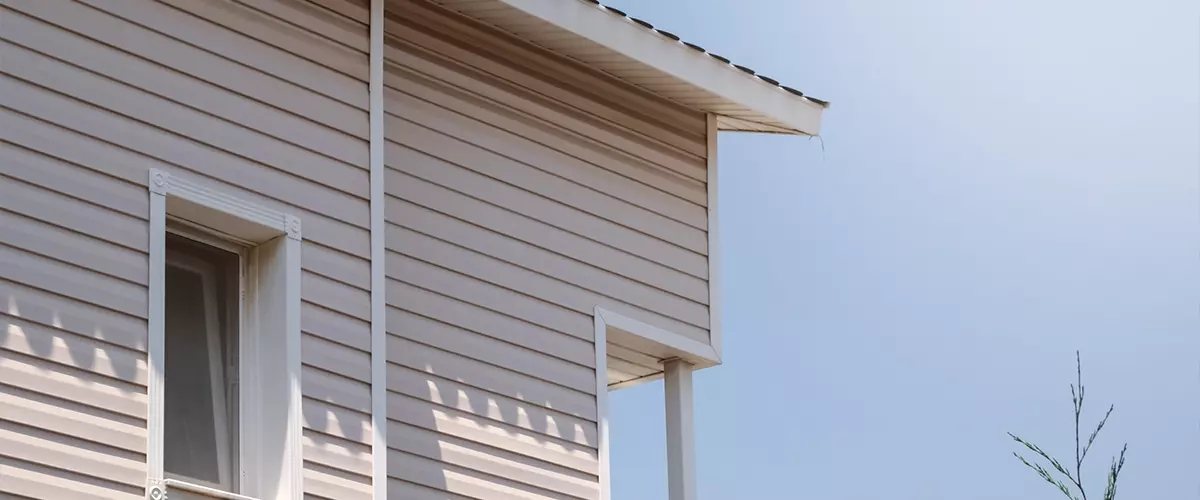
Polyvinyl Chloride (PVC) Siding
Pros & Cons
- Pros: Vinyl siding is low maintenance, requiring only occasional cleaning. It is also extremely durable, resistant to both harsh weather conditions and pests. Unlike wood, vinyl doesn’t rot or suffer from termites. In addition, it comes in a variety of colors and styles, including horizontal and vertical panels, to match your home’s exterior and enhance curb appeal.
- Cons: Despite its durability, vinyl siding can crack in extremely cold weather. Moreover, low-quality vinyl might fade over time under intense sunlight.
Material and Installation Costs
Durability/Warranty
Fire Resistance and Other Qualities
While vinyl siding is not as fire-resistant as other siding materials like brick or stucco, it does offer some resistance and will not ignite quickly. It also provides decent soundproofing qualities.
Vinyl siding is a versatile and affordable siding option. However, like with any other siding material, a professional installation is recommended to ensure its efficiency and longevity. Whether it’s vinyl, stucco, or other types of siding you choose, the best siding for your house depends on your personal preferences, budget, and the architectural style of your home.
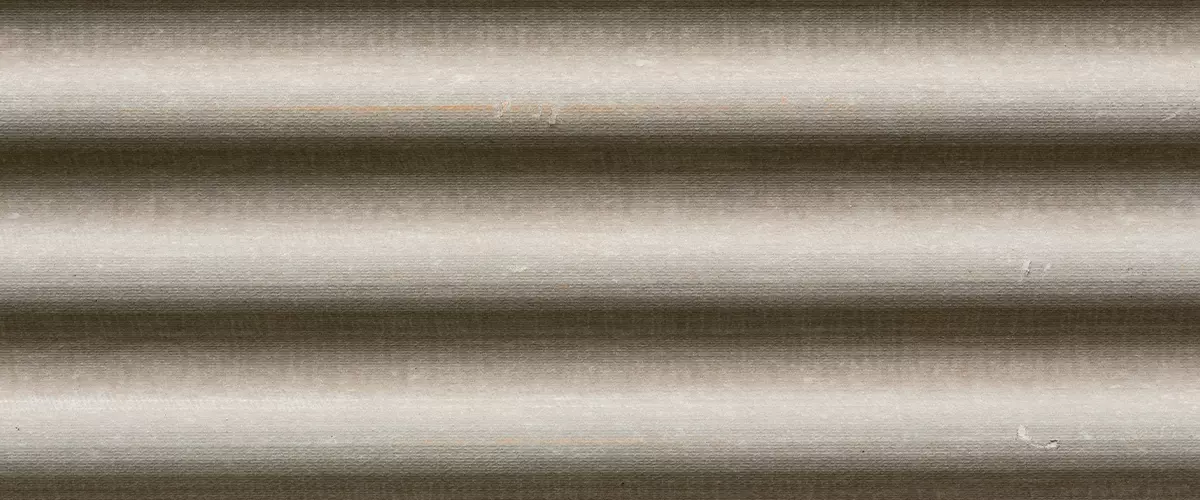
Fiber Cement Siding
Fiber cement siding is a durable siding material made from a mix of wood fibers, Portland cement, and other natural materials. With its ability to mimic other siding materials like wood or stone, fiber cement siding can significantly boost your home’s exterior appearance.
Pros & Cons
- Pros: Fiber cement siding is extremely durable and can withstand harsh weather conditions. This low-maintenance option does not require repainting or sealing. It can mimic the look of natural wood, brick, or stone, offering an appealing combination of natural looks with synthetic durability.
- Cons: Installing this type of siding is labor-intensive, thus making the installation process more costly. Furthermore, it’s heavier than other siding options, requiring more manpower during installation.
Material and Installation Costs
Durability/Warranty
Fire Resistance and Other Qualities
Fiber cement siding is noncombustible, making it a fire-resistant choice. It also provides good soundproofing, adding to the serene environment inside your home.
Choosing the right siding for your home involves considering various factors like cost, durability, maintenance requirements, and aesthetics. It’s advisable to consult with a professional to understand the best options for your home.
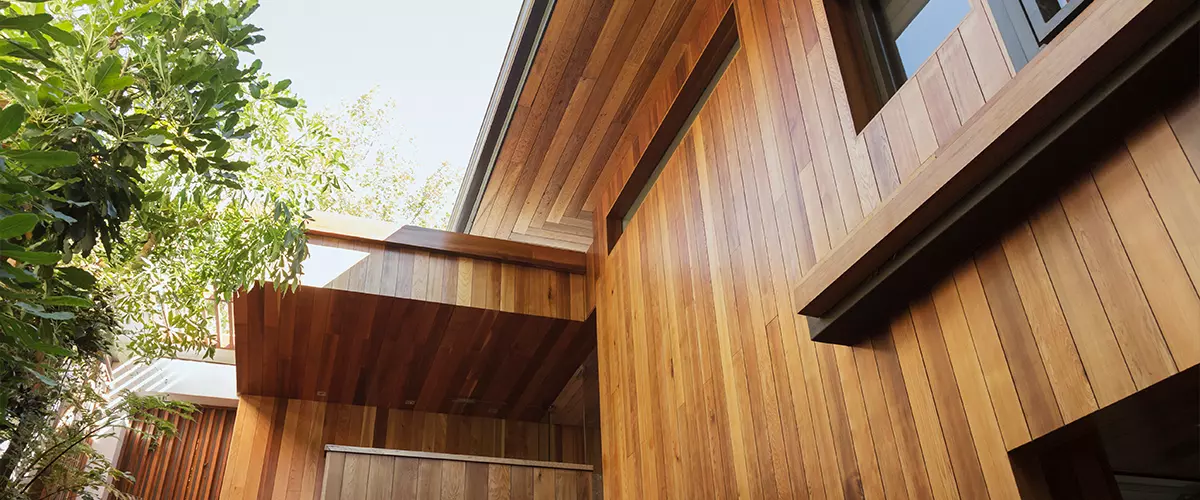
Wood Siding
Pros & Cons
- Pros: Wood siding materials come in various types, including cedar, pine, spruce, and redwood. These natural woods offer a unique and timeless appeal that enhances the curb appeal of your house. Furthermore, wood siding is environmentally friendly and can last for many years with proper maintenance.
- Cons: As a natural material, wood is susceptible to pests like termites and weather-related damage. Wood siding requires regular maintenance, including painting, staining, or sealing to preserve its look and durability.
Material and Installation Costs
Durability/Warranty
Fire Resistance and Other Qualities
While wood siding offers some insulation properties, it is not fire-resistant. However, it can be treated with fire retardants for added safety. The natural material also provides excellent soundproofing capabilities.
In conclusion, choosing the right siding for your home is a significant decision that needs careful consideration. Factors such as the architectural style of your house, climate, desired appearance, and budget all play a crucial role. Whether it’s natural wood siding, vinyl, fiber cement, or another type of siding, professional installation is key to ensuring durability and achieving the best possible finish.
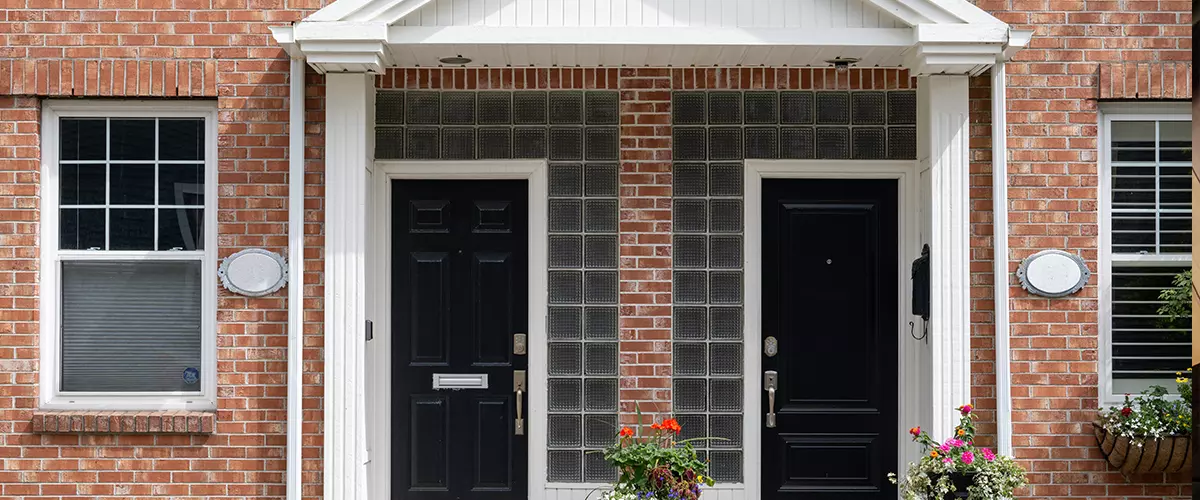
Brick Siding
Brick siding, commonly used in traditional architecture, offers a timeless and classic appeal. Made from fired clay, brick siding comes in various sizes and textures. It’s a go-to choice for many homeowners due to its durability and low maintenance.
Pros & Cons
- Pros: Brick siding is incredibly durable, can withstand harsh weather conditions, and requires little maintenance. It is also fire resistant, offering safety advantages compared to other siding materials. Aesthetically, it provides a traditional look that boosts the home’s curb appeal.
- Cons: Installation of brick siding is labor-intensive and thus, more costly. Moreover, while extremely durable, brick can be susceptible to moisture absorption leading to potential damage over time.
Material and Installation Costs
Durability/Warranty
Fire Resistance and Other Qualities
As a fire-resistant material, brick siding provides an additional layer of safety for the home. It also offers good soundproofing qualities, enhancing the quiet and peace within your home.
In your search for the best siding for your home, consider various factors like cost, appearance, maintenance requirements, and durability.
Brick siding, while more costly, offers long-term benefits and a classic aesthetic. Consult with local contractors to understand the specific costs and benefits in your area.
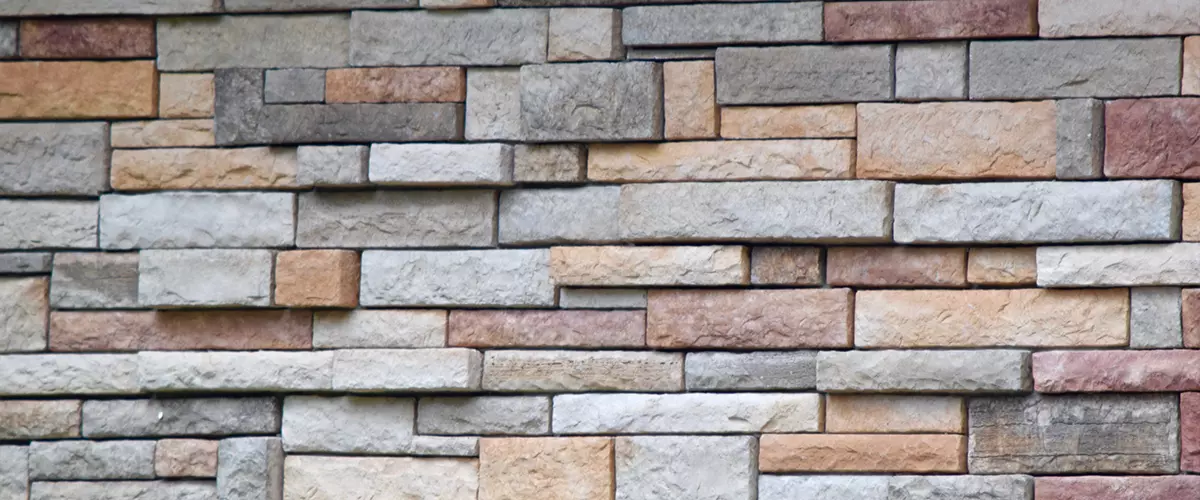
Stone Veneer Siding
Pros & Cons
- Pros: Stone veneer siding is durable and can withstand harsh weather conditions. It’s a low-maintenance siding option that can mimic various types of stone, enhancing your home’s exterior aesthetics.
- Cons: Despite its durability, stone veneer is not as sturdy as real stone. Also, installation can be labor-intensive, resulting in higher costs.
Material and Installation Costs
Durability/Warranty
Fire Resistance and Other Qualities
Stone veneer siding is fire-resistant, providing a safe option for your home. It also offers good soundproofing, contributing to a calm and serene interior.
Choosing the right siding for your home is no small task. It’s crucial to consider the house’s architectural style, your budget, personal preferences, and the local climate. So whether it’s brick, stone veneer, fiber cement, or any other type of siding, professional installation will ensure its efficiency and longevity.
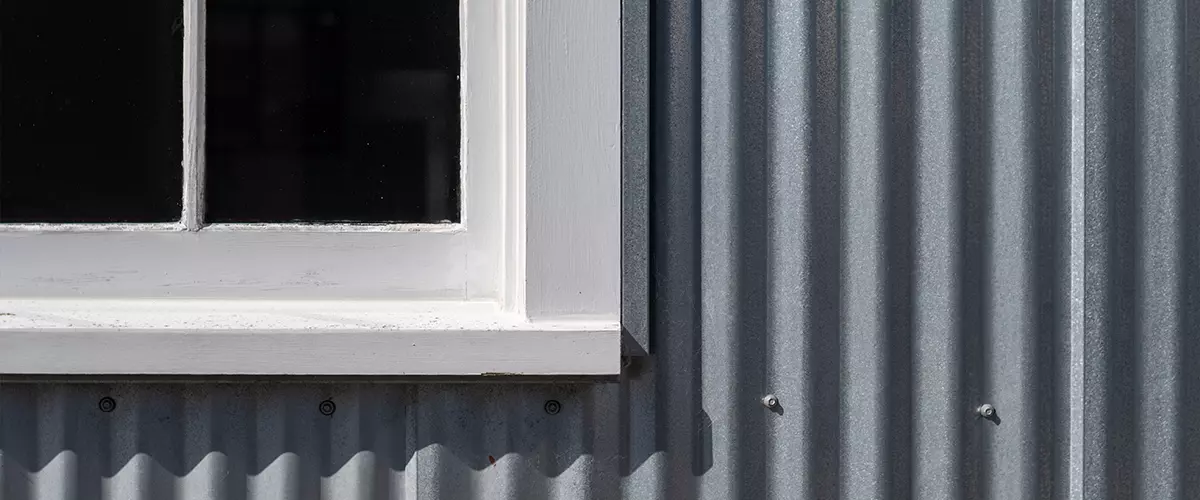
Metal Siding
Pros & Cons
- Pros: Metal siding is incredibly durable, able to withstand harsh weather conditions and resist fire, making it a safe choice for your home. Unlike wood, it is resistant to pests and does not rot. It’s a low maintenance option that retains its appearance for years.
- Cons: On the other hand, metal siding is more prone to dents and scratches. It can also be noisy during rain or hail, and is not as energy efficient as some other siding materials.
Material and Installation Costs
Durability/Warranty
Fire Resistance and Other Qualities
Metal siding offers excellent fire resistance, adding an extra layer of safety to your home. However, it does not offer the same level of soundproofing as some other materials.
When choosing the best siding for your home, consider factors such as cost, durability, maintenance, and aesthetics. A local contractor can provide valuable advice tailored to your home’s exterior, the local climate, and your personal preferences. It’s essential to ensure professional installation, irrespective of your siding choice, to guarantee efficiency and longevity.
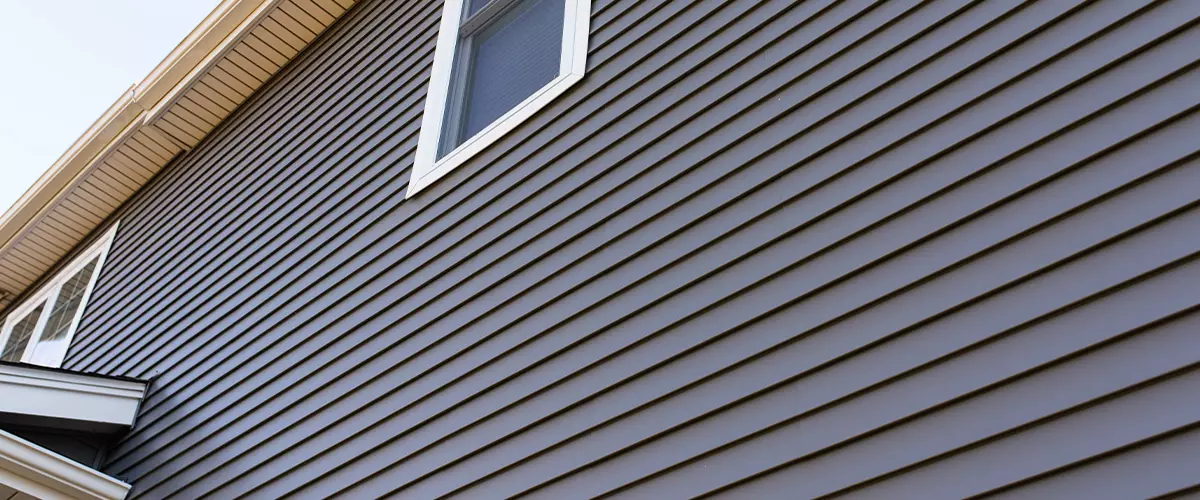
Vinyl Siding
Pros & Cons
- Pros: Vinyl siding is a low-cost, low-maintenance siding material that can be made to mimic different types of siding materials like natural wood, brick, or stone. It comes in a variety of colors and styles, including horizontal and vertical panels, to complement different architectural styles. Vinyl siding is also resistant to pests and rot, unlike wood, making it a durable choice for homeowners.
- Cons: Despite its durability, vinyl siding can crack in extremely harsh weather conditions. It’s also not as energy efficient as insulated vinyl siding or other siding materials, and can fade over time due to exposure to sunlight.
Material and Installation Costs
Durability/Warranty
Fire Resistance and Other Qualities
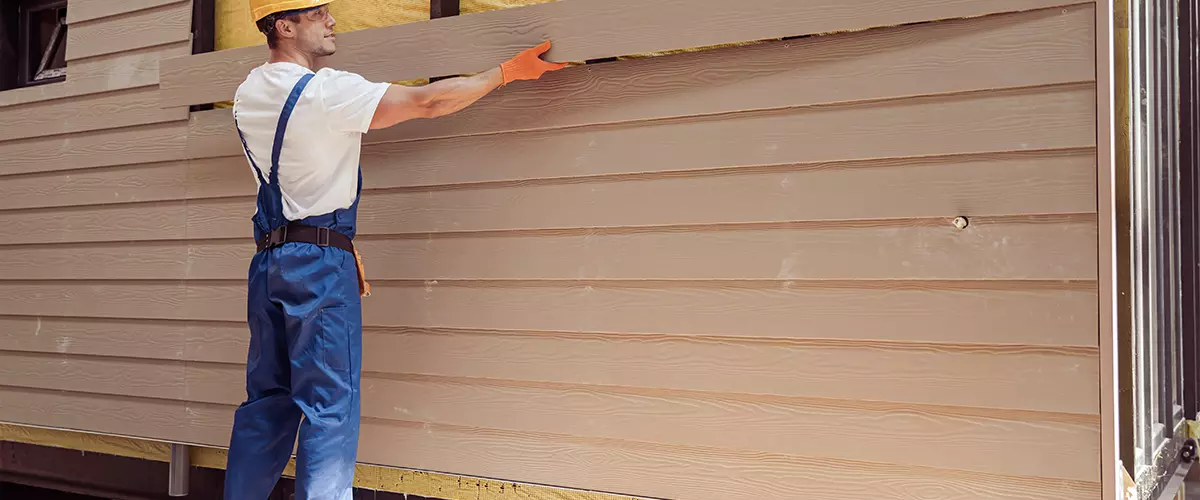
Engineered Wood Siding
Pros & Cons
- Pros: Engineered wood siding is resistant to common issues facing real wood, such as termite damage and rot. It can be pre-primed and ready for paint, allowing homeowners to customize their home’s exterior. It’s also a more eco-friendly siding option than natural wood.
- Cons: Despite its resistance to pests, engineered wood siding can still be susceptible to moisture if not properly installed and maintained. It’s also not as fire-resistant as materials like brick or metal.
Material and Installation Costs
Durability/Warranty
Fire Resistance and Other Qualities
Engineered wood siding isn’t as fire resistant as other siding options. However, with its natural wood look, it can greatly enhance your home’s curb appeal while also providing decent soundproofing.
Choosing the best siding for your home depends on various factors – your budget, your home’s architectural style, the local climate, and your personal preferences. Irrespective of the type of siding you choose, professional installation is essential to ensure its efficiency and longevity.
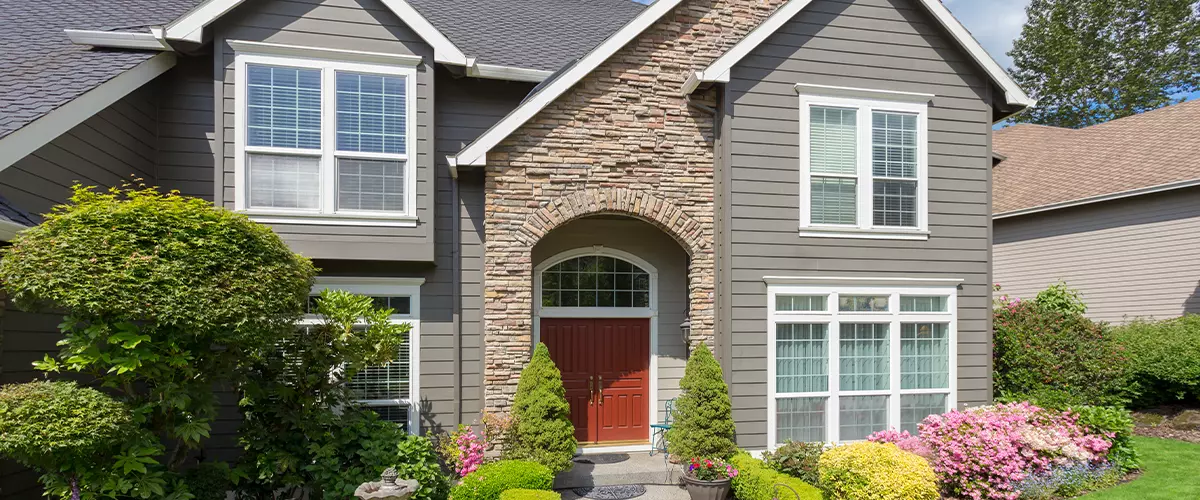
Stone Siding
Pros & Cons
- Pros: Stone siding is extremely durable and can withstand harsh weather conditions, adding up to its longevity. It adds a unique aesthetic appeal and significantly enhances your home’s curb appeal. Stone is also fire-resistant, making it an excellent choice for safety.
- Cons: Stone siding is among the most expensive types of siding options available on the market. It’s heavy and requires a professional installation process to ensure it is installed correctly. Unlike wood or engineered wood, stone doesn’t provide the same level of insulation.
Material and Installation Costs
Durability/Warranty
Fire Resistance and Other Qualities
Stone siding is incredibly fire-resistant, offering an added layer of safety to your home. However, its heavy weight and lack of insulation might be a drawback for some homeowners.
Other factors to consider include the siding material’s energy efficiency, durability, maintenance requirements, and cost. Always ensure professional installation to guarantee the longevity and efficiency of your new siding.
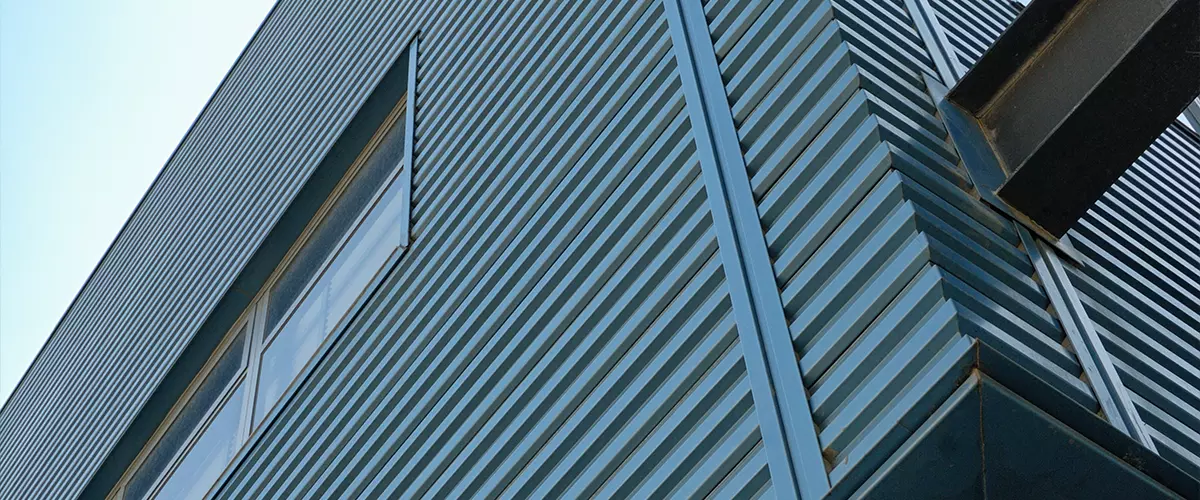
Steel Siding
Pros & Cons
- Pros: Steel siding is an incredibly durable siding material that can withstand harsh weather conditions. It’s resistant to fire, making it a safer option compared to other materials. The low maintenance nature of steel ensures it remains aesthetically appealing over the years, contributing to the home’s exterior charm. Steel siding comes in both horizontal and vertical panels, allowing for various architectural styles.
- Cons: Steel siding is among the costlier options, and professional installation is a must due to its heavy weight and technical demands. It’s also less energy efficient than insulated vinyl siding or fiber cement siding.
Material and Installation Costs
Durability/Warranty
Fire Resistance and Other Qualities
Steel siding is highly fire-resistant and durable, making it a safe and long-lasting choice. It’s also recyclable, contributing to its eco-friendly appeal. However, it lacks the soundproofing qualities found in other siding options.
In conclusion, the best siding for your home depends on your specific needs, preferences, and budget. From natural wood siding, engineered wood siding, brick siding, stone veneer siding, to steel or aluminum siding, each option offers its unique set of benefits and drawbacks.
Regardless of your choice, a professional installation process is crucial. Always consult with a local contractor to ensure a proper installation for optimal performance, energy efficiency, and curb appeal.
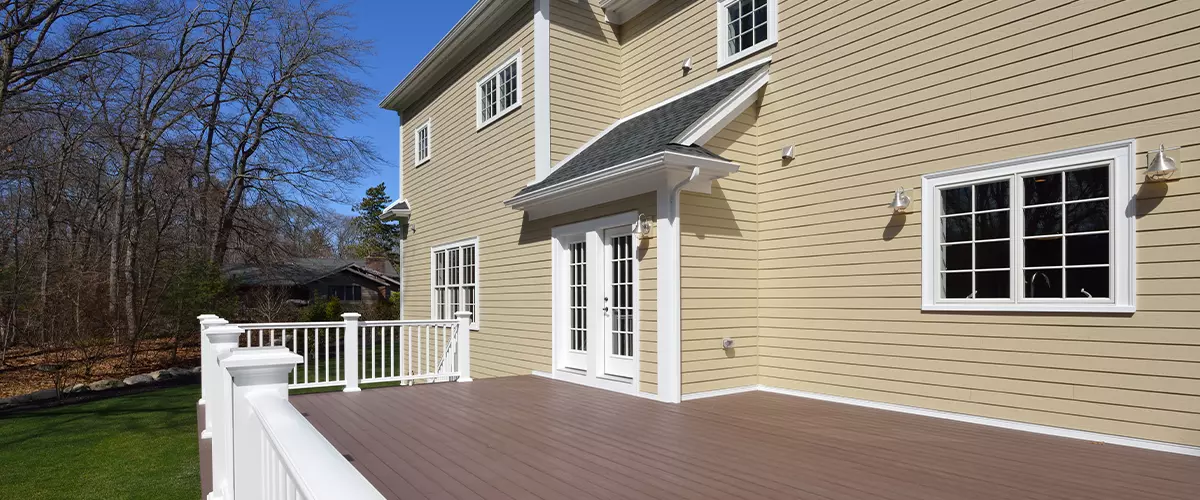
Composite Material Siding
Pros & Cons
- Pros: Composite siding is highly durable, with resistance to rot, pest damage, and harsh weather conditions. It requires minimal maintenance and comes in various styles and colors, which can enhance the curb appeal of your home. It is fire resistant and tends to have better insulation properties than other materials.
- Cons: Despite its durability, composite siding can still be susceptible to moisture damage if not adequately maintained. The color of composite siding can also fade over time due to sun exposure.
Material and Installation Costs
Durability/Warranty
Fire Resistance and Other Qualities
Composite siding is fire resistant, providing an added layer of safety for your home. It also has good insulation properties, contributing to the energy efficiency of your home.
When choosing the best siding for your home, it’s essential to consider the long-term costs, aesthetics, and durability. By understanding the pros and cons of different siding materials, you can make an informed decision that suits your individual needs and preferences.
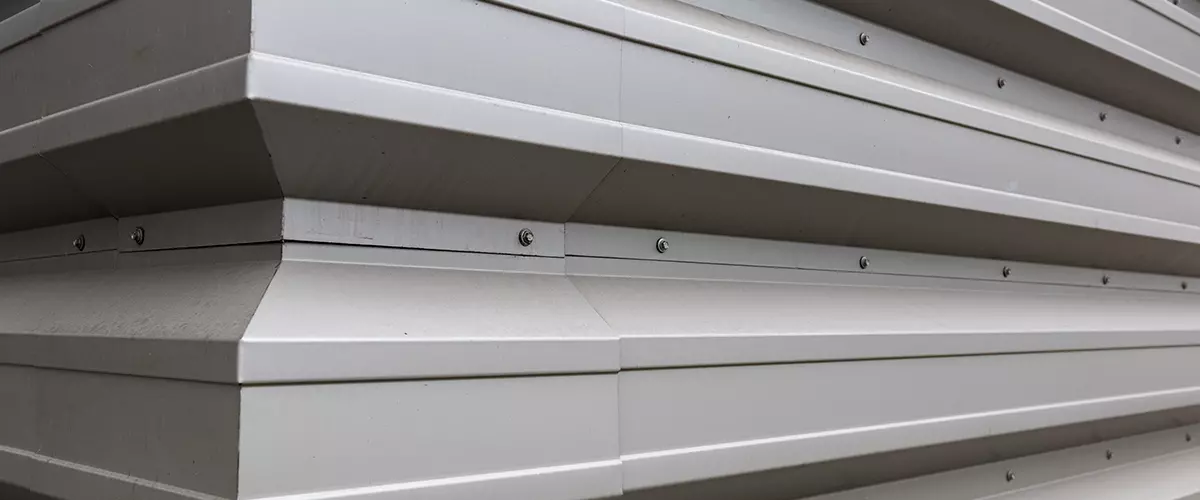
Aluminum Siding
Pros & Cons
- Pros: Aluminum siding is lightweight, making it easier and cheaper to install than heavier materials. It’s resistant to fire, rust, and pests, and it comes in a variety of styles and colors to suit different architectural preferences. Furthermore, aluminum siding is recyclable, making it an environmentally friendly choice.
- Cons: Despite its many benefits, aluminum siding is prone to denting and scratching. Over time, it may also fade and require repainting. It doesn’t provide as much insulation as some other siding options, which could impact energy efficiency.
Material and Installation Costs
Durability/Warranty
Fire Resistance and Other Qualities
Aluminum siding is fire-resistant, providing a safety advantage for your home. However, it doesn’t offer much in terms of soundproofing. Despite this, its durability, low maintenance requirements, and recyclability make it an attractive option for many homeowners.
When it comes to home siding, the best choice is dependent on your individual needs, aesthetic preferences, and budget. Whether you choose aluminum, composite, steel, or another material, make sure to consult with a professional to ensure proper installation and optimal results. Always consider the long-term benefits and costs when making your decision.
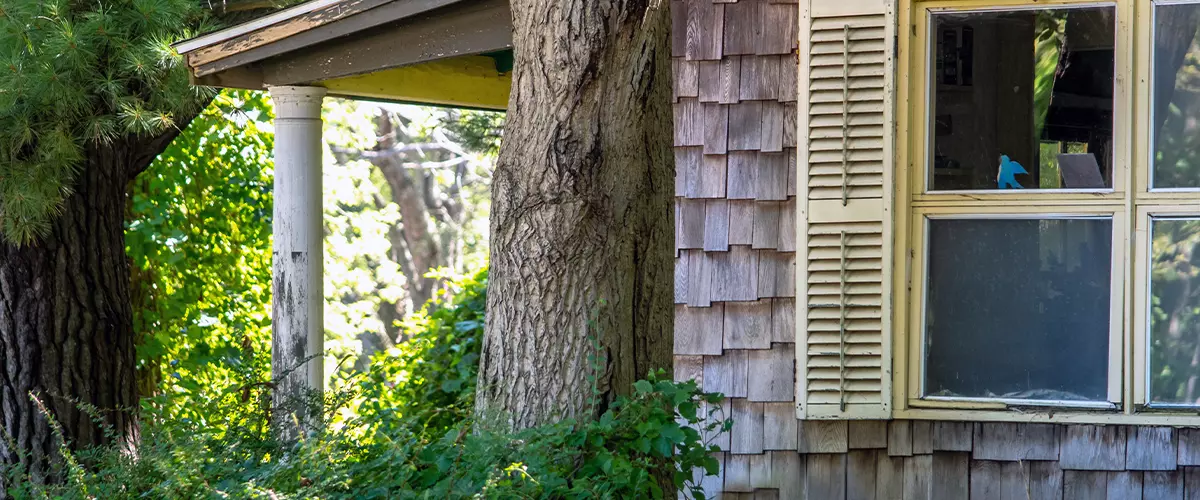
Cedar Shingle Siding
Pros & Cons
- Pros: Cedar shingles are known for their beautiful, natural look. They’re also quite durable and weather-resistant, able to withstand harsh climates better than some other wood types. Additionally, cedar shingles are eco-friendly, as cedar is a renewable resource.
- Cons: On the downside, cedar shingle siding requires regular maintenance to prevent decay and damage from insects or moisture. They are also more expensive than other siding options and are not fire-resistant unless treated with a fire retardant.
Material and Installation Costs
Durability/Warranty
Fire Resistance and Other Qualities
Cedar shingle siding is not naturally fire-resistant and will need to be treated with a fire retardant for added safety. On the plus side, cedar is known for its excellent insulation properties, helping keep your home warm in the winter and cool in the summer, increasing its energy efficiency.
In conclusion, cedar shingle siding can add a touch of natural beauty to your home, but it does come with a higher price tag and maintenance requirements. Remember, the siding material you choose should align with your home’s architectural style, your budget, and your personal preferences. Always consult a siding professional to ensure you make the right choice for your home.
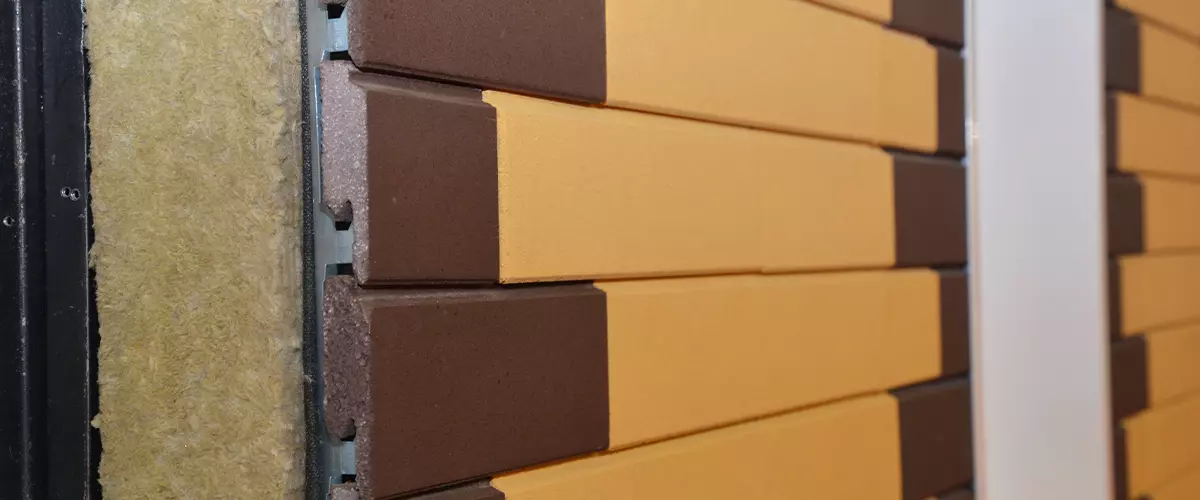
Fiberglass Siding
Pros & Cons
- Pros: Fiberglass siding is extremely durable and resistant to various weather conditions. It’s also impervious to insects, doesn’t warp or rot, and requires minimal maintenance. It’s available in a wide range of colors and finishes, including options that mimic the appearance of wood or stone. As a bonus, it’s an environmentally friendly choice due to its energy efficiency and recyclability.
- Cons: While its durability is a major asset, fiberglass siding can be more expensive than other options. Installation can also be challenging, typically requiring professional service. Some homeowners may also dislike the less natural appearance compared to wood or stone siding options.
Material and Installation Costs
Durability/Warranty
Fire Resistance and Other Qualities
Fiberglass siding is flame-resistant, offering an additional layer of safety for your home. It also provides excellent insulation, helping to improve your home’s energy efficiency. However, it’s worth noting that it doesn’t contribute significantly to soundproofing.
For homeowners seeking a modern, low-maintenance, and durable siding solution, fiberglass siding is a strong contender. While the initial investment is higher, its long lifespan, environmental friendliness, and energy efficiency may make it a cost-effective choice in the long run. As always, consult with a siding professional to make sure it’s the right choice for your home.
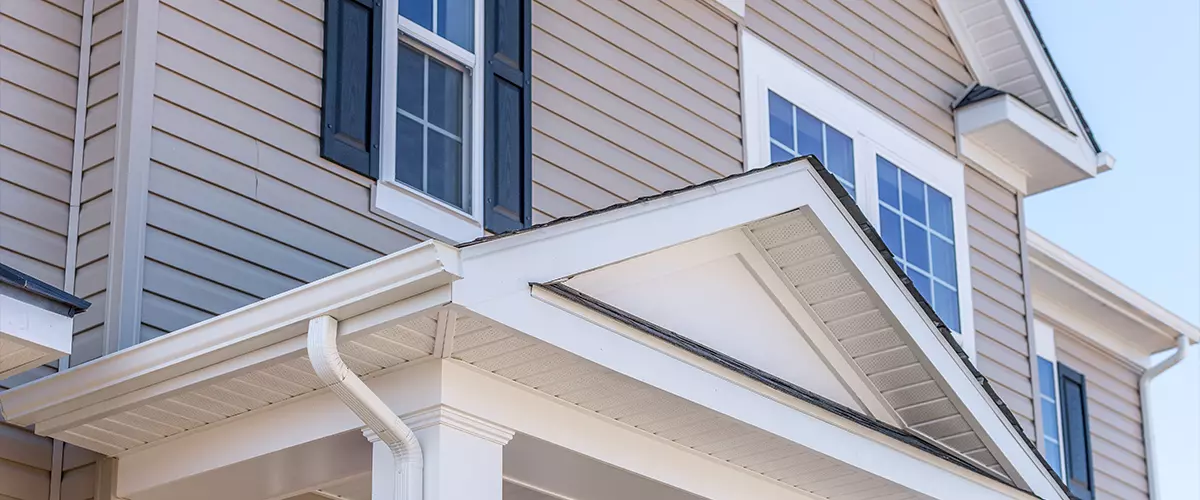
Siding Types Comparison
| Siding Type | Pros | Cons | Material Cost (per sq ft) | Total Cost Installed (per sq ft) |
|---|---|---|---|---|
| Stucco | Durable, Fire-resistant, Low maintenance, Good soundproofing | Labor-intensive installation, Costly, Not suitable for excessive moisture | $6 - $9 | $10 - $14 |
| Vinyl (PVC) | Low-cost, Low maintenance, Durable, Variety of styles | May crack in extreme cold, Fades over time in sunlight | $2 - $7 | $4 - $12 |
| Fiber Cement | Durable, Mimics natural materials, Fire-resistant | Labor-intensive installation, Heavier than other options | $5 - $9 | $10 - $14 |
| Wood | Natural aesthetic appeal, Various styles | Susceptible to pests, Requires regular maintenance, Expensive | $5 - $10 | $7 - $15 |
| Brick | Incredibly durable, Fire-resistant, Low maintenance | Labor-intensive installation, Costly, Susceptible to moisture | $6 - $10 | $10 - $15 |
| Stone Veneer | Mimics natural stone, Durable, Fire-resistant | Not as sturdy as real stone, Labor-intensive installation | $5 - $10 | $10 - $15 |
| Metal (Steel/Aluminum) | Incredibly durable, Fire-resistant, Low maintenance | Prone to dents and scratches, Noisy in rain/hail, Less energy-efficient | $3 - $12 | $5 - $20 |
| Composite | Durable, Rot/pest resistant, Fire-resistant, Good insulation | Susceptible to moisture, Color may fade | $4 - $8 | $7 - $12 |
| Cedar Shingle | Beautiful natural look, Durable, Eco-friendly | Requires regular maintenance, Expensive, Not fire-resistant | $5 - $10 | $10 - $20 |
| Fiberglass | Extremely durable, Weather-resistant, Low maintenance | More expensive, Challenging installation, Less natural appearance | $4 - $8 | $7 - $12 |
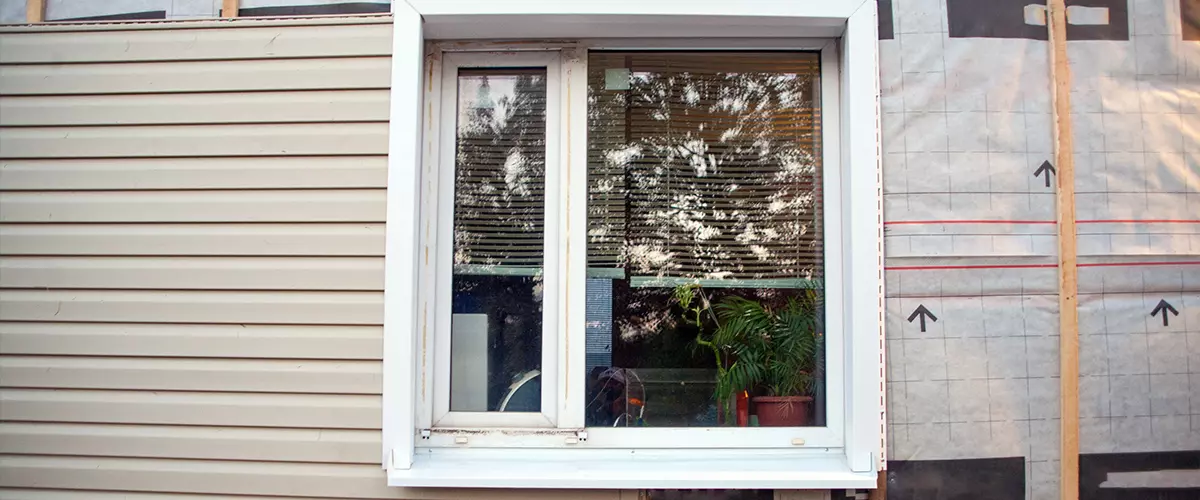
Top 10 Siding Manufacturers in the US
- James Hardie: Known for their high-quality fiber cement siding, James Hardie is one of the leading siding manufacturers in the US.
- CertainTeed: CertainTeed offers a wide range of siding options, from vinyl to polymer, fiber cement, and wood composite.
- Mastic Home Exteriors: A part of the Ply Gem family, Mastic offers high-quality vinyl and aluminum siding options.
- Gentek: Gentek is renowned for their comprehensive range of durable and stylish vinyl and aluminum siding.
- Alside: Alside provides a diverse set of vinyl siding options that cater to a range of budgets and styles.
- Royal Building Products: This manufacturer offers an extensive array of siding options and styles, including vinyl and composite materials.
- Georgia-Pacific: Georgia-Pacific is known for their high-quality vinyl siding products that marry durability and aesthetic appeal.
- Kaycan: Kaycan offers a broad range of vinyl, aluminum, and engineered wood siding.
- LP Building Solutions: Specializing in engineered wood siding, LP Building Solutions offers products that are durable, sustainable, and aesthetically pleasing.
- Allura: Allura specializes in fiber cement siding that mimics the look of real wood, providing durability and versatility in a range of colors and styles.
Types of Siding FAQs
The best siding for your home depends on several factors including your budget, aesthetic preference, climate, and maintenance willingness. However, fiber cement siding is often highly recommended. It’s durable, resistant to termites and fire, and requires minimal maintenance.
Furthermore, it can mimic the aesthetics of wood, stone, or brick, and typically lasts longer than most other materials. Always consult a siding professional to make an informed decision.
Cladding and siding are often used interchangeably, but there is a slight difference. Siding specifically refers to the protective material, typically panels, attached to the exterior of a building’s walls.
Cladding is a broader term that encompasses the external material used as a ‘skin’ or layer on a building, which can include siding, brick, or stone. While both serve to protect the structure from weather, cladding can also be used for aesthetic enhancement and insulation.
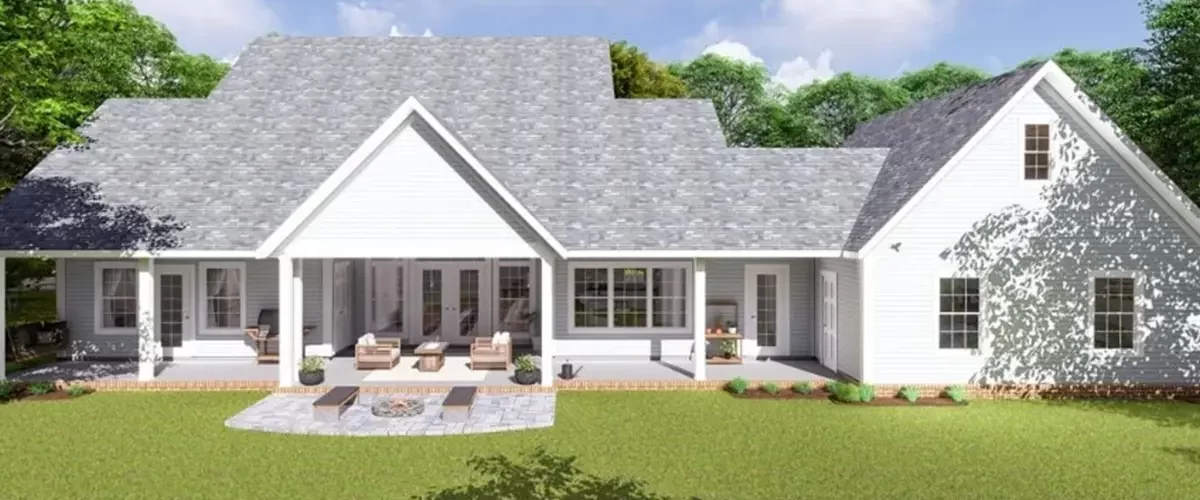
Or Contact Omaha's Home Building Experts
Choosing the right siding is an integral part of designing and building your dream home. From vinyl to fiber cement, there are a multitude of options to consider based on your specific needs. No matter the choice you make, ensuring it is properly installed and maintained is crucial to the longevity and aesthetic appeal of your home. That’s where we come into play.
Built By Davis is a trusted home builder in Omaha, NE. We are committed to delivering high-quality craftsmanship tailored to the unique desires of our clients. Our team of experts is ready to guide you through the process, making sure your home is both beautiful and durable. Don’t hesitate to reach out to us at (402) 804-9321. Let us help you create a home that is truly yours.
